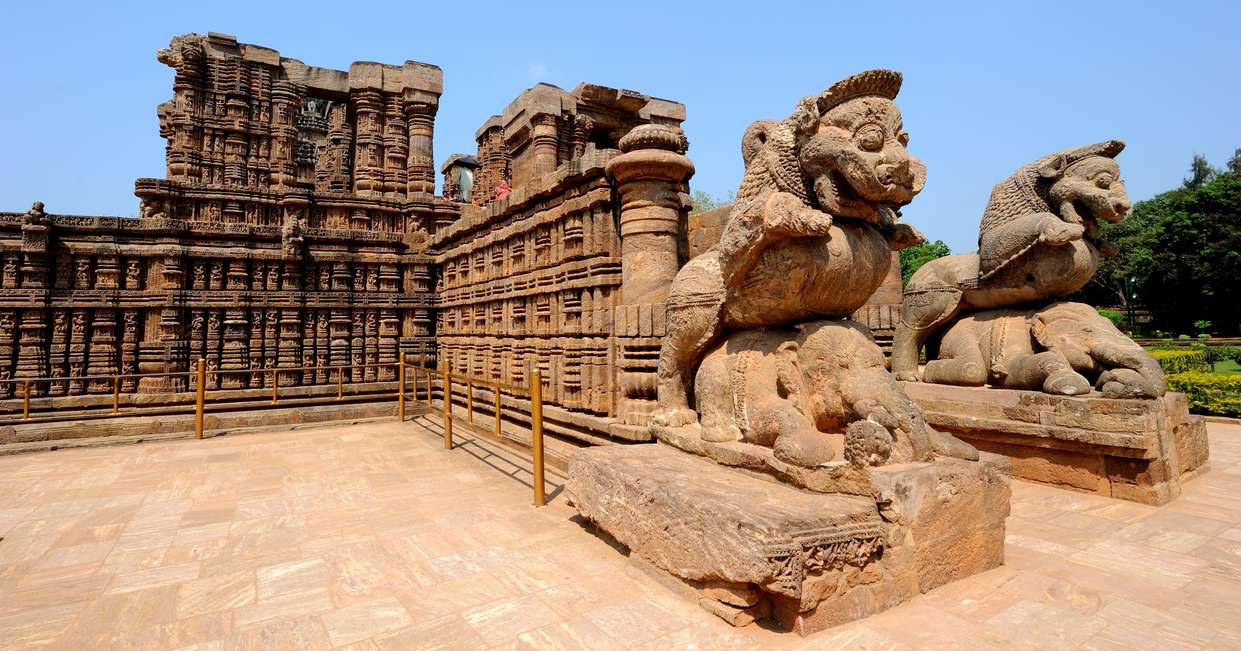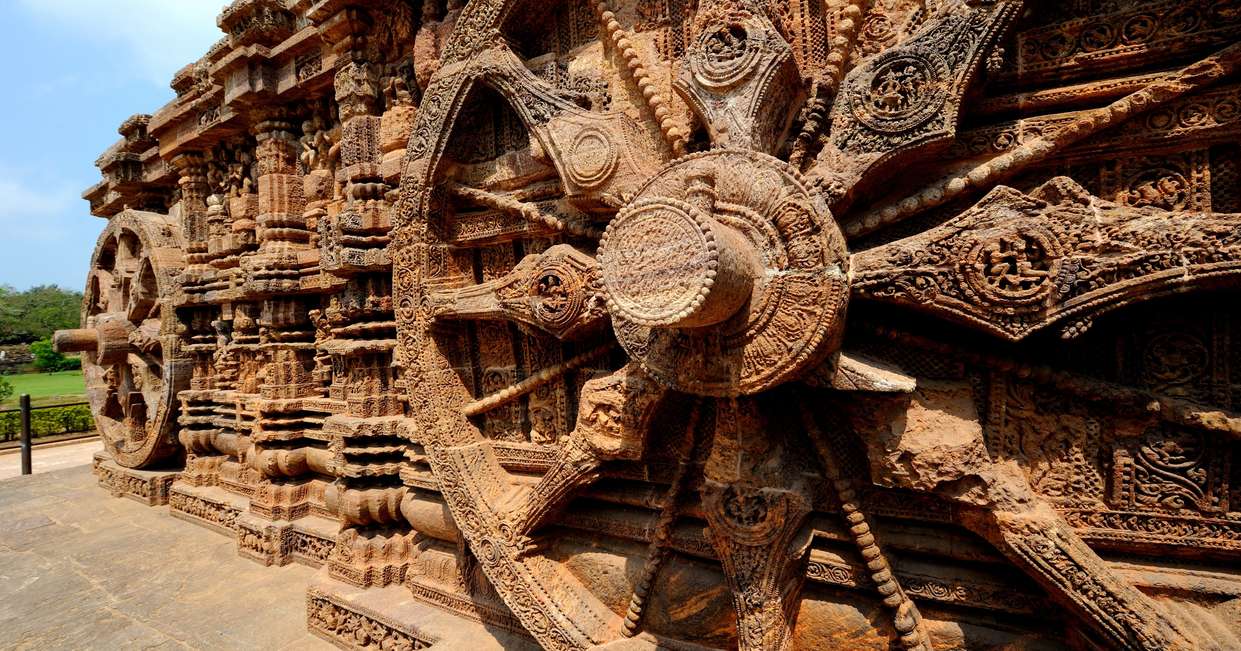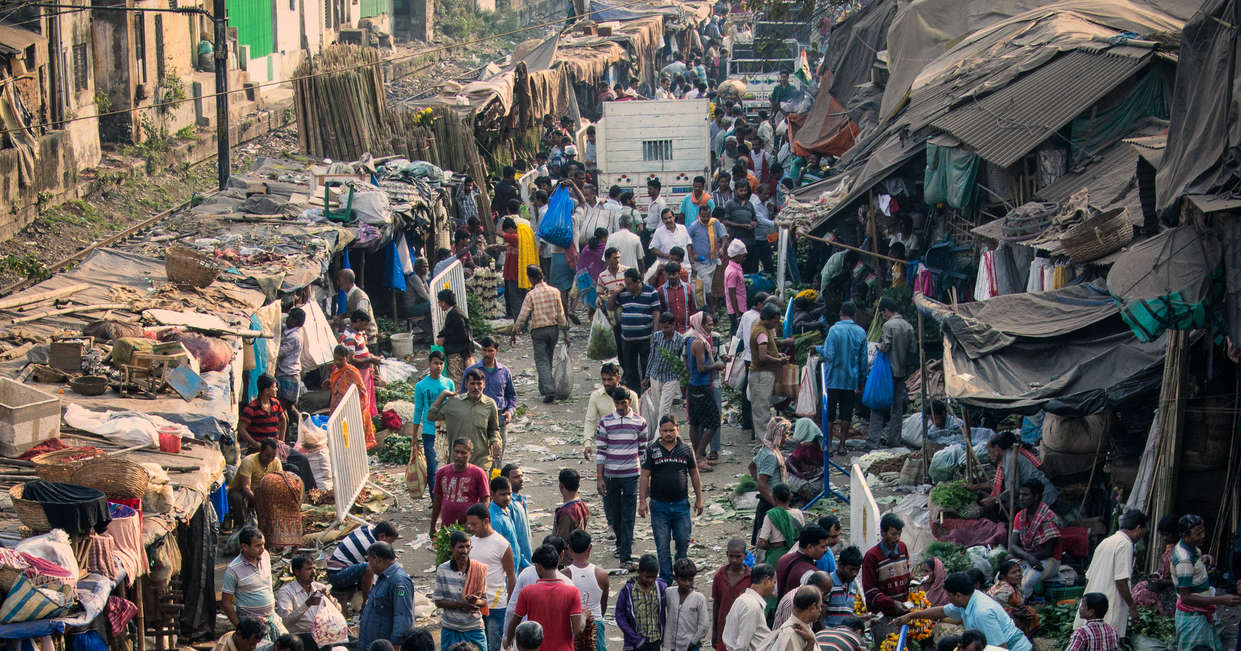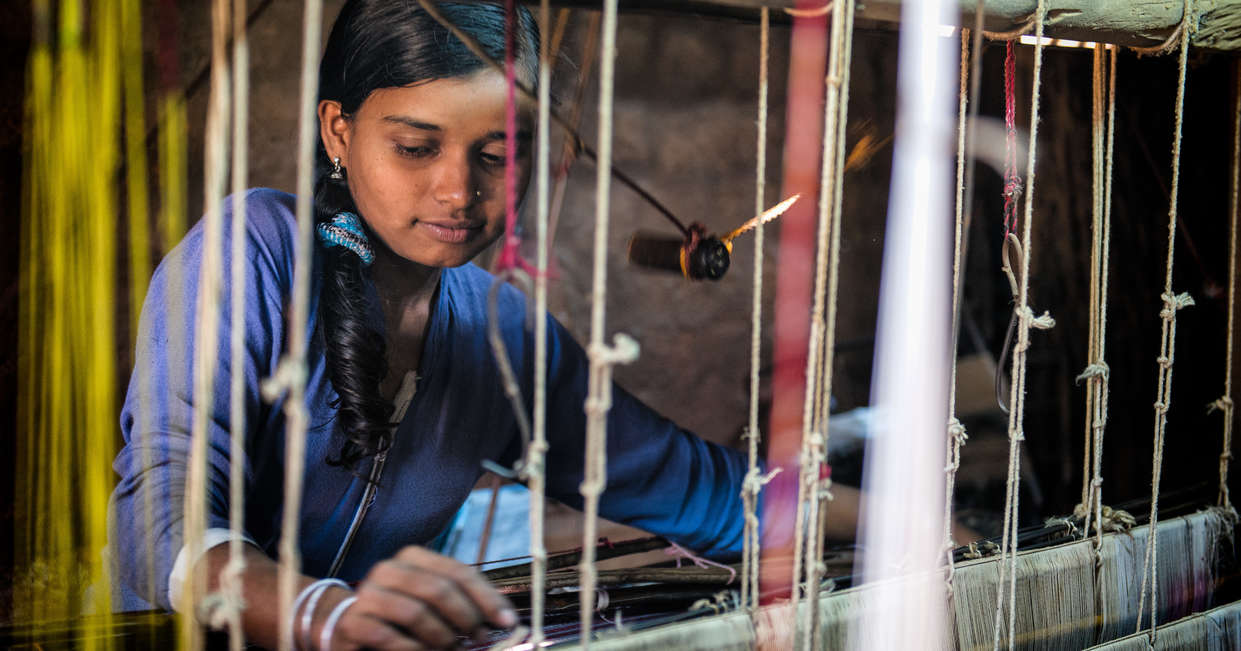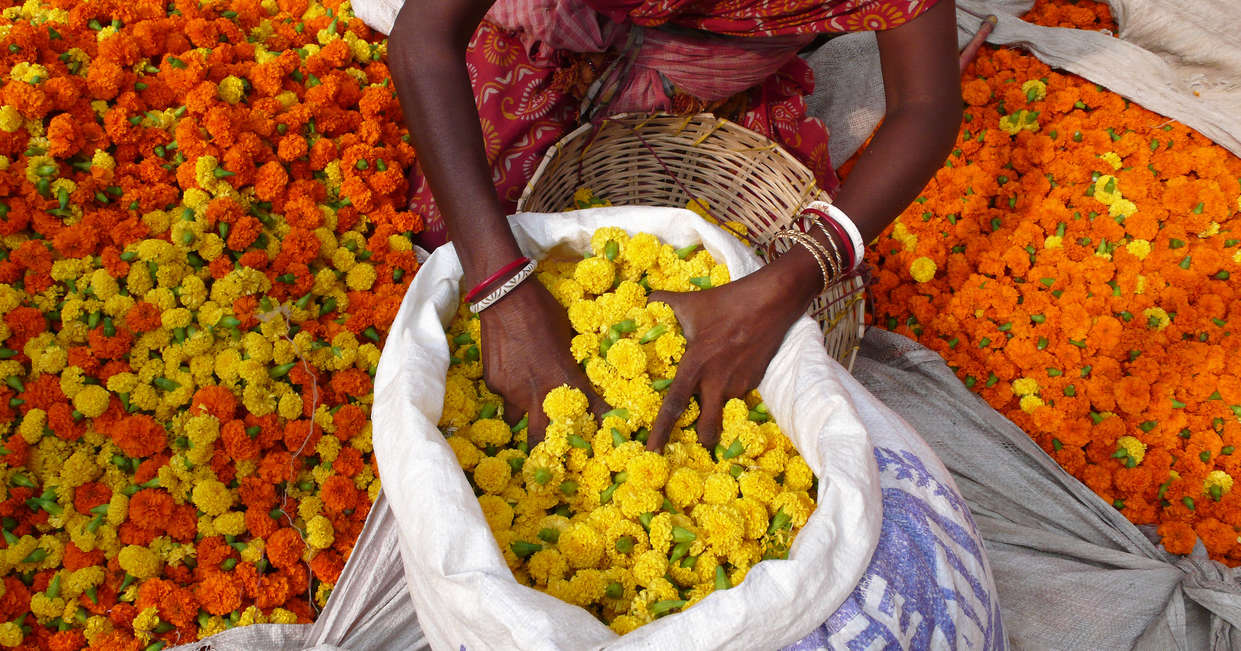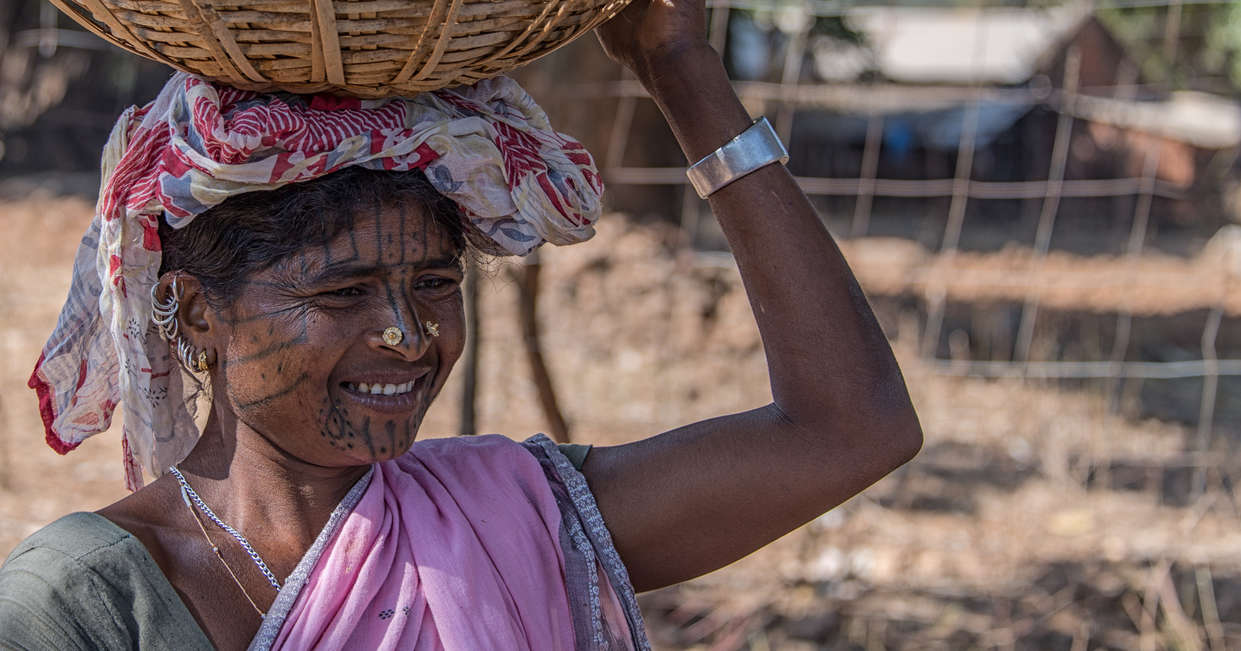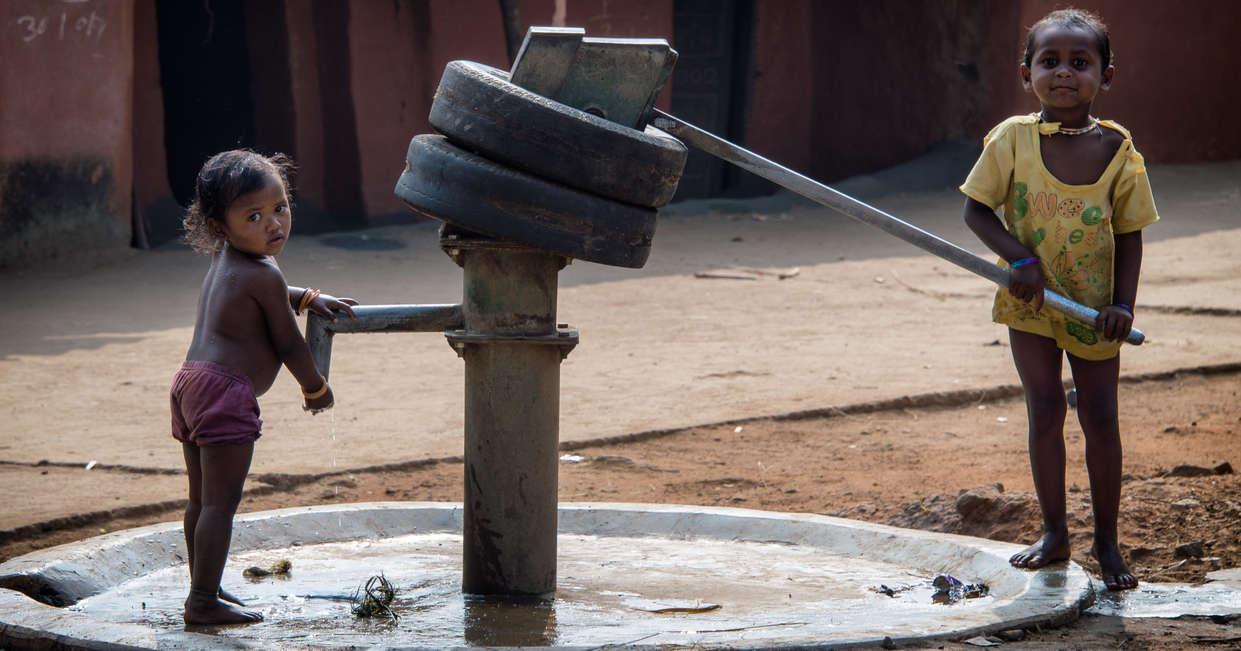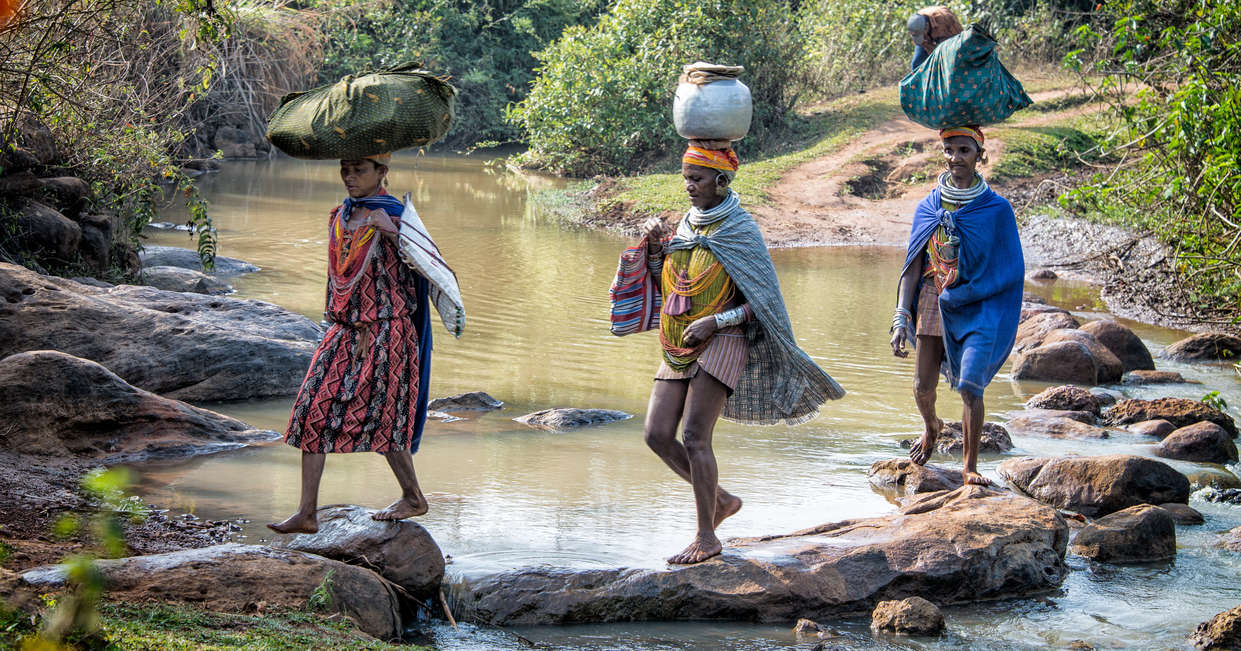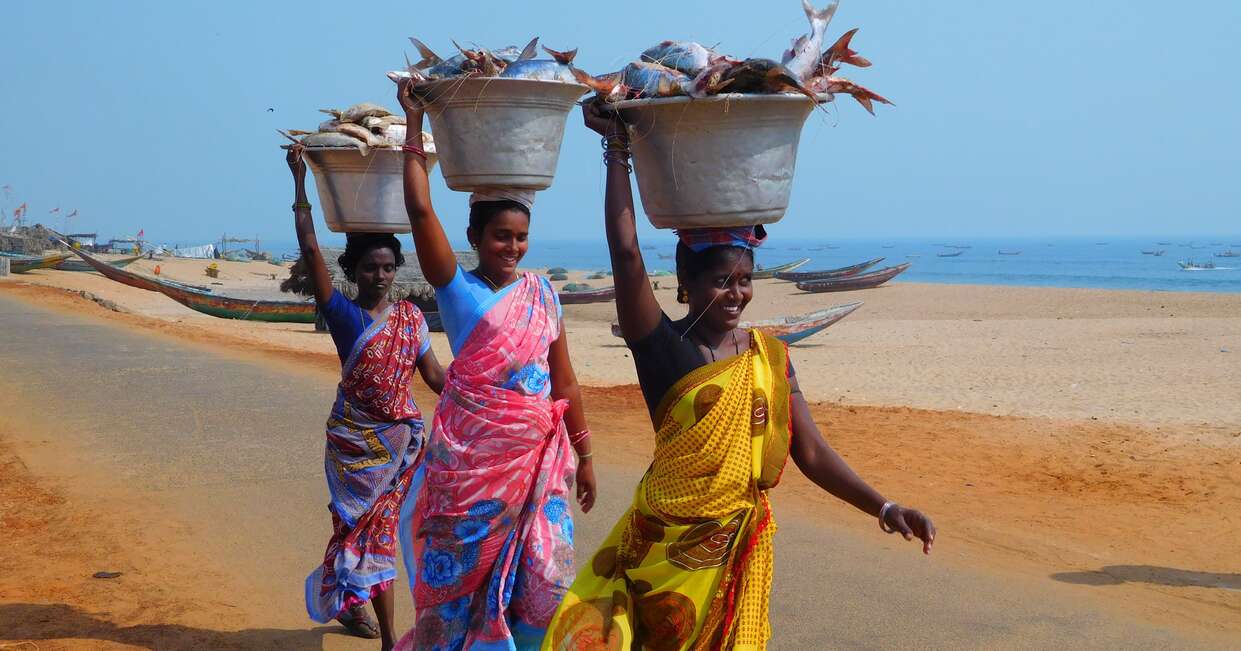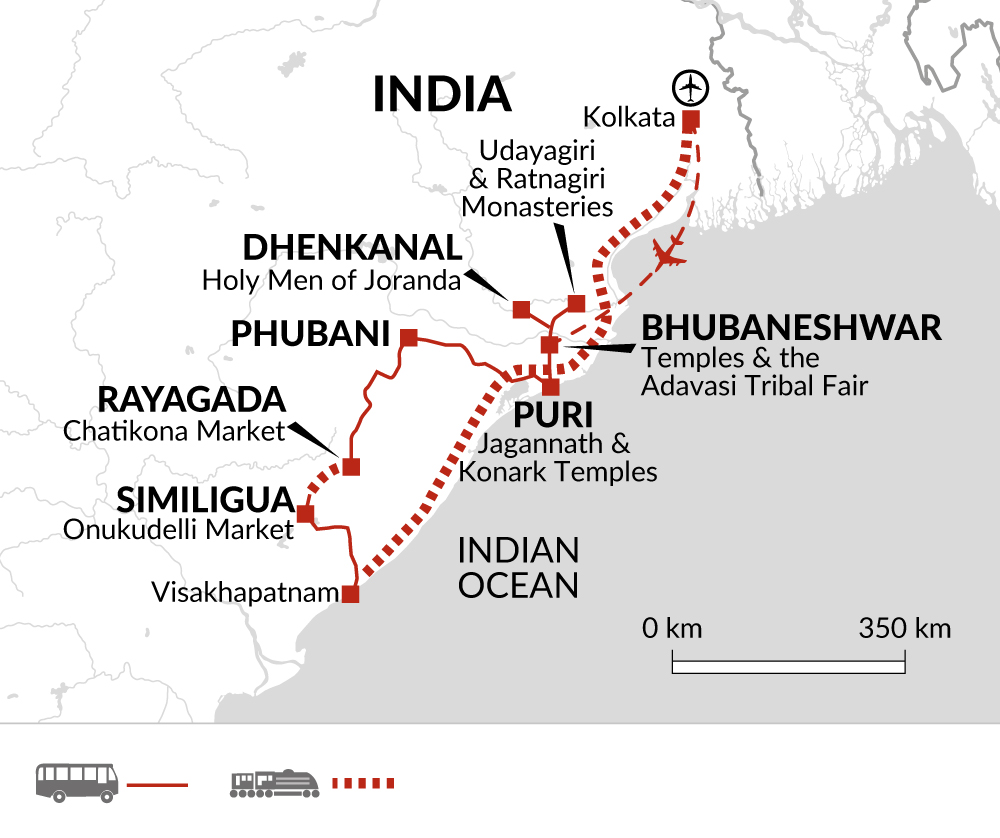Tribes and Temples of Orissa
Tribes and Temples of Orissa
$2880
Tribes and Temples of Orissa
14 Days Starting and ending in Kolkata
Visiting: Kolkata, Bhubaneswar, Dhenkanal, Ratnagiri, Puri, Konark Sun Temple, Chilika Lake, Rayagada, Chati Kona, Onukudelli, Visakhapatnam
Tour operator:
Tour code:
TTO
Guide Type:
Fully Guided
Physical rating:
FullOn
Age range:
16-99
Trip Styles:
Interests:
Cultural, History, Religion and Spiritual, Ruins-Archaeology
Activities:
From:
$2880 (USD)Tour Overview
Visiting Orissa is like taking a journeying back in time, from the 'first people' tribes, to the temples and monasteries of the Buddhist and Hindu eras, to the time of the Raj. As well as exploring incredibly spiritual temples in Bhubaneshwar and Puri we will meet the tribal people at the Adivasi Tribal Fair, and mix with them in colourful markets and remote villages.
Adivasi Mela - Mix with members of the tribes of Orissa at the annual tribal fair where their cultures and traditions are celebrated
Local markets - Wander around colourful remote markets where people from the Bonda and Dongria Kondh tribes come - their only regular interaction with the wider world
Joranda - Witness the holy men of the Mahima Dharma religion as they perform their evening rites with fire and chanting
Highlights
- Meet the tribal people at the Adivasi Mela and in local markets and villages
- Visit the holy city of Puri and the nearby Konark Sun temple
- Explore Kolkata's busy streets and impressive buildings
Itinerary
Day 1: Join Trip In Kolkata (Calcutta); Explore The Kalighat Area.
Location: Kolkata
Accommodation: Hotel, Lytton
Arrive in Kolkata (Calcutta) . Once the capital of British India, Kolkata has had a turbulent past. It was central to the struggle for Indian independence and thousands of Bengali refugees came here at the start of the 1900's. It is a city of striking contrasts and can be overwhelming initially, but the unusual sights, pungent smells and the chaotic sounds of the country's second largest city are an experience unique to India.
For those arriving on time today our Leader plans to meet you in the hotel reception at 2pm for the welcome meeting and to start to acquaint ourselves with the city, taking a short walk around the Kalighat area. One of the oldest parts of the city, it is densely populated and busy, with an interesting temple dedicated to the goddess Kali.
If you would like to receive an airport transfer today, you'll need to arrive into Kolkata Airport (CCU), which is approximately one hour from the hotel.
Please note that if you wish to join the walk around Kalighat today, you must arrive at the hotel by 2pm. If you are booking your own flights, we recommend giving yourself at least one and a half hours to clear the airport. From the airport to the hotel is around one hours' drive, so therefore the latest your flight can arrive is 11.30am. Should you miss the welcome meeting, your Leader will inform you of any essential information as soon as you catch up.
Day 2: Explore Kolkata's Temples And Historic Buildings
Location: Kolkata
Accommodation: Hotel, Lytton
Meals Included: Breakfast
Today we explore this fascinating city with a tour of some of its major sights. We will visit St John's Church and the many historic Raj buildings around Dalhousie Square, the Jain temples, Mother Theresa's home and the magnificent marble dome of the Victoria Memorial, where the sumptuous grandeur of European and Moghul influences come together in a blaze of white marble. We also visit the clay modellers' village of Kumartuli where the potters spend all year creating a wealth of images and idols for the annual festivals and, as the time approaches for the models to be prepared for the upcoming rituals, the streets are filled with an overwhelming display of brightly coloured and richly attired idols.
Day 3: Fly And Drive To Dhenkanal, Visit The Mahima Holy Men Of Joranda
Location: Bhubaneswar, Dhenkanal
Accommodation: Dhenkanal Palace
Meals Included: Breakfast, Lunch, Dinner
We take the morning flight to Bhubaneshwar and then continue by road to the small town of Dhenkanal. The drive will take around five to six hours with stops at some interesting villages on the way: Nuapatna is a small village where the majority of the inhabitants make a living from the looms they operate in their home workshops, selling their textiles at local markets; Sedabarni village is famed for its Dhokra metal work, using a casting technique that has existed in India for more than 4000 years. The technique involves creating artefacts from wax which are then used to make a clay mould. The wax is melted away and replaced by molten metal before the clay is broken to reveal the final piece of art. Subjects often include animals and tribal people.
We'll reach Joranda, the centre of the Mahima Dharma religion, in time to see the late afternoon ceremony. Founded by Mahima Swami in the 1800's, the religion shunned the elitism of Hindu Brahmanism, opposed the caste system and embraced those from lower levels of society. Its followers worship a single, formless god and believe in universal kindness, non-violence and freedom from greed. An hour before sunset, the holy men of the religion, clad only in saffron loin cloths, practice rites involving fire, chanting and prostrating before the setting sun. Followers of the religion from nearby communities will join them and receive blessings from the holy men.
This evening we spend the night in the Maharajah of Dhenkanal's palace. With the atmosphere of an aristocratic homestay rather than a hotel, we'll be welcomed by the estate's staff and even the Maharajah and Maharani themselves if they are in residence! All the rooms are part of the original palace, and as such are all very different to each other, with the furnishings from years gone by giving us a wonderful sense of the past.
Day 4: Drive To Bhubaneshwar Visiting Udayagiri And Ratnagiri Monasteries En Route
Location: Udayagiri, Ratnagiri
Accommodation: Hindustan International Bhubaneswar
Meals Included: Breakfast
A three hour drive will bring us to the Udayagiri and Ratnagiri Monasteries. Active between the 7th and 12th centuries, the site is composed of stupas, temples, statues, carvings and monasteries. We spend a couple of hours exploring before continuing for two to three hours to Bhubaneshwar, often referred to as 'temple city', and the capital of the state of Orissa.
Day 5: Explore The 'Temple City' Of Bhubaneshwar And Visit The Tribal Fair
Location: Bhubaneswar
Accommodation: Hindustan International Bhubaneswar
Meals Included: Breakfast
With over 500 temples, the city of Bhubaneshwar certainly earns its nickname of 'temple city' and is referred to in old Hindu scriptures as one of Lord Shiva's favourite places. Indeed, the name of the city is derived from Shiva's Sanskrit name, Tribhubaneswar which means 'lord of three worlds'. We'll take a leisurely walk through an area that has over 100 temples, including some of the most important of the region. We'll see the elaborate Lingaraja Temple, the largest in the city, which has intricate carvings of various Hindu deities, and a rare Brahma temple, located on the edge of the Bindusagar River. There are many legends to explain why there are very few temples dedicated to Brahma, even though he is one of the 3 main gods in Hinduism. Some suggest that as the creator of the universe he has done his job so there is simply no need to worship him, others point to darker reasons, such as Brahma being worshiped by demons or that he has been cursed never to be worshipped because of his unacceptable behaviour.
In the afternoon we'll start to learn about the ethnic minorities of the region with a visit to the excellent tribal museum before making our way to the Adivasi Mela. Adivasi translates as 'original people' and reflects the fact that the tribal people are the first inhabitants of the area, and of the Indian subcontinent. Each year their cultures are recognised at a 'mela' or fair, held in Bhubaneshwar, where people from most of the 62 tribes come to celebrate their unique cultural identities. There is a craft market, and a wide range of activities such as performing arts and cultural shows. The mela runs for two weeks each year from Jan 26th. The trip starting on February 3rd will visit towards the end of the festival and although the fair may not be as busy as earlier, it will still provide us with a rare opportunity to see many of the tribal people and experience something of their culture.
Day 6: Drive To Puri Via Dhauli And The Village Of Pipli
Location: Puri
Accommodation: Hotel, Resort, Holiday Resort
Meals Included: Breakfast
Just outside of Bhubaneshwar, Dhauli Hill is a peaceful spot located on the banks of the River Daya, and the site of the infamous battle of Kalinga. Here, in 262 BC, the Emperor Ashoka's army, allied with the Mauryan Empire, won a very bloody confrontation with the state of Kalinga, with the loss of some quarter of a million lives. After seeing the horrors of war, the Emperor famously converted to Buddhism and renounced violence. He inscribed pillars, carvings and rock faces all around his kingdom with messages of peace and tolerance, and teachings of Buddhist Dharma, or law. There are 33 of these inscriptions remaining today, with a particularly interesting one carved in to an elephant shaped rock at the site of this important battle.
On our way to Puri we stop at the village of Pipli. Established in the 10th century to accommodate the craftsmen who made the large Applique (patchwork embroidery) umbrellas and canopies for the Jagannath Temple in Puri, the village still carries out the same function today, as well as making more everyday items such as wall hangings and lanterns used at Diwali.
Puri is one of the four holiest cities in India, a pilgrimage site for Hindus, and home to the 12th century Jagannath Temple, named for Lord Jagannath, the 'Lord of the Universe' and a form of Vishnu. The English word juggernaut is derived from this deity and refers to the massive, unstoppable chariots that are used in the temple's processions which would reputedly crush devotees under their wheels in years gone by. Only Hindus are allowed inside the temple but we can walk around the outside and wonder at the architecture, carvings and buildings, including the one of the world's largest kitchens. Here, 56 varieties of vegetarian food are cooked daily as offerings to Lord Jagannath, and following strict rules prescribed in ancient Hindu texts. The food is then shared amongst the needy and some of it is sold in the temple's Ananda Bazaar which is next to the eastern gate and considered to be a very auspicious place to consume the temple food.
Day 7: Discover The Konark Sun Temple And Chandrabagha Fishing Village
Location: Konark Sun Temple
Accommodation: Hotel, Resort, Holiday Resort
Meals Included: Breakfast
This morning we'll take an hour's drive to nearby Konark Sun Temple, a UNESCO World Heritage Site built in 1250. The temple is in the shape of a giant chariot and the stone wheels are sundials that are said to be able to tell the time to an accuracy of a single minute. Legend has it that the temple emits an aura of great power, which local stories attribute to two very powerful magnets hidden in the structure that used to allow the king's throne to hover in front of impressed crowds.
Near to the temple we'll visit a fishing community at Chandrabagha beach and see how the fishermen use traditional boats and methods to make their living from the sea.
There'll be some free time during the afternoon. You may like to wander along Puri's long sandy beach, or return to the Jagannath Temple to explore more of the complex and the streets around it.
Day 8: Boat Ride On Chilika Lake, Drive To The Tribal Belt And Phulbani
Location: Chilika Lake
Accommodation: KP Salunki
Meals Included: Breakfast, Dinner
Chilika Lake is the largest coastal lagoon in India and the second largest in the world. It is a haven for migratory birds, especially from October to March when the lake plays host to over 160 species including white bellied sea eagles, purple moorhen, flamingos, and storks. There are also around 150 Irrawaddy dolphins in the lake, although in such a vast area these can be difficult to spot. The shores of the lake are dotted with small communities that fish the lake from their traditional wooden boats. Just after dawn we spend an hour and a half exploring the lake before beginning our journey to Phulbani and the tribal heartland of Orissa. The drive is around six to seven hours including stops for lunch and comfort breaks.
Day 9: Walk Through Tribal Villages And Drive To Rayagada
Location: Rayagada
Accommodation: Hotel, Sai International
Meals Included: Breakfast, Lunch, Dinner
A two hour drive this morning will take us to the starting point of a four kilometre walk through villages inhabited by the Kondh people. Like all the tribal groups of Orissa, they are indigenous to the subcontinent and pre-date the Dravidians and Aryans that the majority of the Indian population descend from. The Kondh are the most numerous tribe and are split in to various subsets. Today we'll meet the Kutia Kondh, who can be distinguished by their tattooed faces, a tradition that began with the arrival of European colonists to in an attempt to make the women of the tribe less attractive and prevent assaults. This tradition has only recently ceased and the youngest person we are likely to see with a tattooed face will be in her early 20s. Most Kondh villages have a place to sacrifice animals to the gods of the hills before planting a new crop, or after harvesting a successful one. In the past they used to practice human sacrifice, known as Meriah, and it was considered honourable to be sacrificed on behalf of the community. Their ancient belief system is based on animism and the worship of nature and ancestors, although today many aspects of other religions have been adopted, and some tribal people have converted completely to Hinduism, Christianity or Islam.
We continue to drive deeper in to the tribal belt, heading for Rayagada. On the way we stop for a picnic lunch, and then wander around the colourful weekly market at Kotgarh where we will find more Kondh people as well as people from the nearby villages.
A note on visiting the tribes: The tribal people whose villages we visit today, and who we will meet at the markets, have limited interaction with the wider world. Your local Leader and local guide will work carefully to ensure that their sensitivities are considered and that we do not do anything to cause offence or to disrespect their way of life. You may find the tribes a little more reticent than the majority of Indian people, but by following the leader's and local guide's advice regarding interaction and photographs, you will get a rare and special glimpse into their fascinating cultures.
Day 10: Visit The Chatikona Market Where The Dongria Kondh Come To Buy And Sell Their Goods
Location: Chati Kona
Accommodation: Hotel, Lemon Castle
Meals Included: Breakfast, Lunch, Dinner
Dongria means 'hills' and refers to the fact that the Dongria Kondh live at the higher altitudes and worship the mountain God 'Niyam Raja'. Once a week they descend to trade at the local market at Chatikona. The girls and boys of the tribe leave their families once they reach adolescence, living in separate dormitories until they get married. The groom has to pay a 'bride price' for the honour of marrying and this may include a period of time when he has to work for the bride's family for free. The ladies have quite distinctive dress with combs in their hair, three nose rings and colourful necklaces.
The location of the Chatikona market is next to a train line and we plan to take a local passenger train most of the way to our next destination, Similiguda, with a packed lunch from the hotel - a journey of around three hours. There is no possibility to reserve seats and it is likely that we will have to stand for the first few stops but we will be rewarded with a truly local experience. The train trundles through beautiful countryside, stopping at many small rural stations while people board and alight with their loads from the market. The service can be unreliable so we will have the option to drive if we need to.
Day 11: Visit Onukudelli Market And See The Bonda Tribe And The Nearby Duduma Waterfalls
Location: Onukudelli
Accommodation: Hotel, Lemon Castle
Meals Included: Breakfast, Lunch, Dinner
The Bonda tribe live high up in the hills and their only regular interaction with the outside world is at the Onukudelli market where they come to buy provisions and sell the liquor they produce, walking many miles through the hills to get there. It is thought that their culture has changed little in the last 1000 years. The society is matriarchal and boys generally marry at around 10 to 12 years old, their brides usually six to 10 years older. As with the Kondh, the groom has to pay a bride price, which the bride might have to repay if they divorce. The dress of the women is quite distinctive with thick silver bands around their necks and long strings of colourful beads that cover most of their torsos. Their heads are shaved and covered with a cloth and another piece of cloth, called a 'ringa', goes around the waist. The men wear less interesting attire, but carry their bows and arrows with them, even to the market. These are used mainly for hunting but also for self-defence.
After a couple of hours in and around the market we visit the nearby Duduma Waterfall. We'll be near the top of the falls, able to look down as the waters crash to the green valley below - a great spot to enjoy our picnic lunch in delightful natural surroundings before driving back to the hotel.
Day 12: Drive To Visakhapatnam And Take The Overnight Train To Kolkata
Location: Visakhapatnam
Accommodation: Overnight Train from Vizag to Kolkata
Meals Included: Breakfast
We have a long drive of around six to seven hours today, passing through beautiful countryside and small villages before arriving in to the port city of Visakhapatnam, the largest city of Andhra Pradesh. There'll be time for a quick look around and dinner on the beach before boarding the Coromandal Express overnight train. Travelling along almost the entire coast of Orissa, the train arrives mid-morning in to Kolkata's Howrah Junction railway station, the biggest and busiest railway station in India.
Day 13: Free Afternoon In Kolkata
Location: Kolkata
Accommodation: Hotel, Lytton
We arrive in to Kolkata late morning, and after checking in to the hotel the rest of the day is free for you to relax before your journey home or explore more of the city. You may like to take a cruise on the Hooghly River, enjoy a walk of the old colonial areas or visit the impressive Dakshineswar Kali temple.
Day 14: Trip Ends In Kolkata (Calcutta)
Location: Kolkata
Meals Included: Breakfast
The trip ends after breakfast at our hotel in Kolkata.
There are no activities planned today, so you are free to depart from Kolkata at any time. If your flight is departing later in the day, luggage storage facilities are available at our hotel. If you would like to receive an airport transfer today, you'll need to depart from Kolkata Airport (CCU), which is around one hour from the hotel.
What's Included
-
Meals
Breakfasts:12 Lunches:4 Dinners:5
-
Accommodation
Comfortable
Why Book this Tour
On the east coast of India, Orissa, also known as Odisha, stands out as a particularly fascinating place to visit. The tribes of the region have been around for many thousands of years and are as culturally distant from the modern world as you can imagine. We'll join them at the annual tribal fair where they meet to celebrate their individual cultures, and visit them in villages and at local markets. Orissa also has some of India's most important spiritual and religious sites including the centre of the Mahima religion and the holy city of Puri, which helps to make a visit to the area an exciting and varied experience sure to appeal to anyone that has a love of the subcontinent.
Check out our Q&As
-
I'm going on a walking/cycling trip-do I need to train?
It will depend on the grade and how fit you already are. Check the trip page for details of the walking or cycling grade and how far you’ll be walking/cycling each day. For moderate or challenging trips in particular we’d recommend doing some walks or cycles before you leave to build up your fitness and prepare you for the distances being covered.
-
Who will be my travelling companions on the tour?
We have a wide range of ages nationalities on our small group trips and they come from all walks of life.
-
Should I get travel insurance?
Yes–it is a condition of booking that you are fully insured when travelling with us
-
How long has the tour company been trading?
At Explore, we're the experts in adventure travel. Our small group adventure holidays have been running since 1981. Today, Explore is one of the most trusted travel companies in the UK with over 500 trips to more than 120 countries.
-
Can I join the tour once it has departed?
Yes, but there are no concessions for doing so, and we must have a record in your booking advising as such before the trip departs.
-
Am I contributing to any charity by booking the tour?
Being a responsible company is a large statement, something that has to be entwined within the very fibre of a company. Discover the charities and partnerships we support as part of this at https://www.explore.co.uk/about/sustainability/charities-and-partners
-
What happens if I need to change my holiday date once I’ve booked?
We want to be as clear as and as honest as possible about what happens if you decide to that you no longer wish to travel on your trip. Our booking conditions have details of the costs you’ll incur when you cancel-these charges depend on how long it is before your planned departure.
-
What is the accommodation like?
We choose comfortable accommodation in the best locations possible. We opt for small, local and family-run accommodation where we can, as opposed to large chain hotels. We typically use hotels that are the equivalent of European 3-star, and you’ll usually have an en suite room. Occasionally, where we want to get off the beaten trail we may stay in more basic accommodation.
-
What Ethical Travel credentials does the tour company have?
Sustainability is embedded within the fibre of Explore, it emanates from the inside out. But as we enter a new decade it is clearer than ever that our world needs help, and Explore has created a sustainability strategy based on the 2015 UN’s Sustainable Development Goals.
-
What policies are in place for Covid-19?
Our flexible booking and safety policies mean you're protected before and during your travels with us. Receive a full refund if your trip is cancelled, transfer your trip free of charge up to 10 days before departure minus any irrocoverable costs.
-
Do I need to be very fit to book with you?
All our trips require some level of active participation. This could be on a cultural trip, trek, safari, expedition or voyage. It is in the interests of all members of the group that everyone should be capable of fully participating in the activities of their chosen trip.
-
What documents will I receive before I travel?
Final documents will include a comprehensive trip itinerary, climate and country information, budgeting and packing advice visa and passport information and details on optional activities available.
-
Do you operate a “single share” option and how does it work?
Yes on most of our trips. Most trips are based on customers sharing twin-bedded rooms. If you book a group trip as an individual, you will share a room with someone of the same sex. However, on many trips we offer the opportunity to pay a supplement to pre-book a single room, known as our single room option. On some trips a single room will be provided every night, on others it will be provided o
-
Do we have to be vaccinated against Covid-19 to travel
It’s now a condition of booking a trip with us that customers should have one of the following before they travel - — Be vaccinated against COVID, having received the full recommended course, and allowing enough time for immunity to take effect. Full vaccination includes any booster required to keep the vaccine valid. — Have taken a negative test (rapid antigen or PCR) within 72hrs of departure.
-
Will the accommodation included meet local health and safety regulations?
Explore will only offer hotels that have specific COVID-19 protocols in place and comply with local government guidelines. We will ensure these measures include; enhanced room cleaning, ventilation, social distancing, regular cleaning and disinfection of high frequency touch points in public areas, food safety, staff re-training and minimising contact within the properties.
Reviews from Travellers on this Tour
Dates & Availability
Monday - Sunday
Jan 27, 2025 - Feb 09, 2025Monday - Sunday
Feb 03, 2025 - Feb 16, 2025Book with Confidence
-
Free Date Changes
Explore! allows you to make 1 free date changes, as long as the change is made at least 60 days before the start of the tour.
-
Low Deposit
Explore! requires a minimum deposit of 10% or the full booking value, whichever is less, with the final balance not due until 60 days before departure.
-
Cancellation Policy
We don't charge a cancellation fee, here is a summary of explore! charges.
Up to 60 days before tour starts: Forfeit 100% of deposit.
At 59 days before tour starts: Forfeit 30% of booking price.
At 41 days before tour starts: Forfeit 60% of booking price.
At 27 days before tour starts: Forfeit 90% of booking price.
At 13 days before tour starts: Forfeit 100% of booking price.

.jpg?ext=.jpg)
